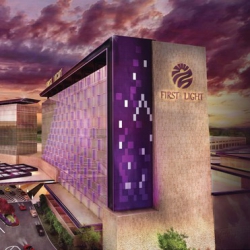
The decision means Massachusetts can collect 17% of the revenues from the Mashpee Wampanoag’s First Light Casino in Taunton.
The Massachusetts Gaming Commission rejected Rush Street Gaming’s plan for a casino in Brocktown. After months of hearings and public relations battles, the Gaming Commission voted 4-1 against the proposal by Mass Gaming & Entertainment, a subsidiary of the Chicago-based Rush Street Gaming.
The development plan called for a $677 million casino on the Brockton Fairgrounds. The Brocktown casino would have been less ambitious than the Wynn Boston Harbor or the MGM Springfield, though it was expected to be, given its placement in the southeastern part of Massachusetts.
Stephen Crosby Critical of Plan
Gaming Commission Chairman Stephen Crosby criticized the plan, saying Mass Gaming’s proposal lacked a “wow factor“.
The day before the vote, Chairman Crosby had signaled Mass Gaming did not have his vote, saying that the plan was a “complete disappointment“.
Crosby reiterated his opinion after the vote on Thurdsay, saying that the Brockton plan “do not meet the standards to make the decision.”
Brockton’s Economic Troubles
Brockton suffers a high employment rate and many of the social problems associated with poverty. The idea was to build a local casino which would put to work thousands of locals, while drawing wealth from the gamblers of the state. Stephen Crosby said the Gaming Commission had wanted to approve a plan for the city, but it wanted a “knockout proposal and a great strategy to lift Brockton” out of its poverty.
In retrospect, the Brockton casino plan faced an uphill battle from the start. The casino would have been only 20 miles away from a bigger casino in Taunton which was just as new, the First Light Resort and Casino, which is owned by Mashpee Wampanoag tribe.
Taunton Casino Dodges a Bullet
The Mashpee Wampanoag tribe has been lobbying to have the Brockton plan rejected. Several compelling arguments were made against Mass Gaming’s plan, because the two competing casinos would have cannibalized customers from each other. With two gaming complexes so close to one another, each would have faced challenges.
Even more compelling is the fact that the Wampanoag tribe’s gaming compact stated they did not have to pay taxes, if another casino was built nearby. Under current terms of the deal, the Native American tribe agreed to pay a 17% tax on its casino revenues to the Commonwealth of Massachusetts.
Conflicting Economic Impact Studies
Mass Gaming commissioned a report which stated the dual casino plan would have generated more money for Massachusetts. Predictably, the Wampanoag tribe released a report which contradicted that assertion.
It is obvious that Massachusetts Gaming Commission bought the Wampanoag’s estimates. Logic would suggest it was not a good idea to forgo payments from a billion-dollar casino in order to collect taxes on a $677 million casino, especially since that casino would have been competing for customers with the billion-dollar enterprise.
Controversial Massachusetts Licensing Process
No matter what the decisions on billion-dollar casino licensing projects, a gaming commission is going to receive criticism. The Massachusetts licensing process which began when the voters of the commonwealth approved 3 licenses in 2011 has been contentious. Stephen Crosby in particular has received criticism for his role in events.
When Caesars Entertainment was eliminated in the early stages of the approval process, it sued the Gaming Commission, claiming Stephen Crosby had asked Wynn Resorts to “stay in the hunt” for a gaming license. At the time, some charged local officials were favoring Suffolk Downs, which had a plan alongside Mohegan Sun of Connecticut.
Later, Crosby’s role in approving the Wynn Boston Harbor plan for Everett came under much greater scrutiny. Wynn Resorts bought a parcel of former industrial land in Everett from a local group, but one of the members of that group was a former convict who was linked to organized crime. In the ensuing investigation, it was learned that Stephen Crosby had close personal ties to a second member of that real estate group — the investor had given Crosby a loan in the 1980s which may have saved him from bankruptcy.
To avoid a conflict of interest, Stephen Crosby recused himself from deliberations on the Wynn approval process. Yet later, the Boston newspapers released stories which alleged Crosby was still seeking to influence decision making behind the scenes. Crosby remains under an ethics probe. based on those accusations. Not longer after those reports, two members of the gaming commission resigned, saying they wanted to spend more time with their families.
Eventually, Wynn Resorts won the casino license. Ironically, Suffolk Downs was unhappy with the process, claiming their better development plan was cast aside for Wynn’s plan. Yet the winning plan represented a $1.6 billion investment, compared to a $900 million investment for the Mohegan Sun-Suffolk Downs plan.
Thus, it is impossible to please everyone. There are winners and losers in casino licensing deals and — everywhere except New York state — the plan with the biggest amount of money committed usually wins.
